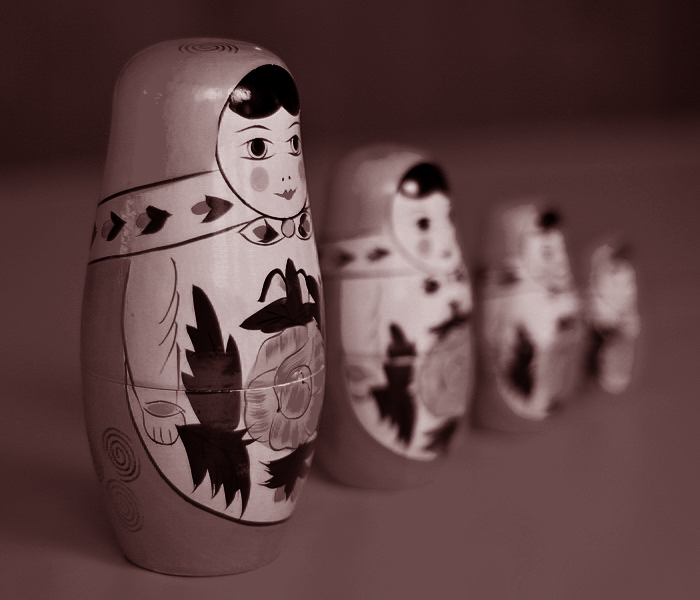Not Only a Hero's Journey
by Rose Lemberg and Shweta Narayan

adapted from "Matryoshka" by Timo Mistler.
Most of us grew up on mythic and folkloric narratives, some learned from friends and elders, others from those cherished books with vivid illustrations and unraveling spines. Folklore and humankind go together; these narratives and songs have traveled through generations, transformed by an endless chain of tellers, yet still recognizable and relevant. They inspire, validate our values, teach us who we are and how we feel, anchor our sense of community. Sometimes those stories argue for social justice; at other times, they reinforce societal norms we might find unpalatable. Folklore is ancient and vibrant, ever reborn, retold, ever assuming new forms. The very definition of folklore, "multiple existence and variation," implies that folkloric forms can never be truly fixed, that the telling can never be truly done.
And yet so many of us have grown with the single voice of nineteen century folklore collectors in pursuit of nationalist values, documents of origin and justification for nationhood; these early folklorists were after recording an authoritative artifact, where the folk stories were given a unified, written form by idealistic and highly educated men – and these men often, though not always, rewrote or adapted the tales to smooth out "kinks" and make the narratives more palatable to their privileged audience. The folklorists have long since moved away from this model and towards a more inclusive, multi-perspective approach to folklore in all its glorious variation – but the household texts we’re familiar with are still those produced by nineteenth and early twentieth century nationalist collectors — the Brothers Grimm, Lönnrot, or the writers of the Pune Mahabharata [1] — and so we remember the name Grimm, but not the names of the many folk tellers who shared their stories with the learned brothers. The household books still give us only single stories and perspectives, robbing folklore of that which is most vital to it – its permeability, the personal nature of telling.
The Journal of Mythic Arts (now sadly defunct) returned those multiple voices to many of us, both in the poetry and fiction it featured, but also in its non-fiction, which introduced the general reader to folklore rather than grimmlore. In this issue, we celebrate JoMA with readers’ retrospectives and an interview with Terri Windling; the non-fiction section is rounded out with a personal reflection on the value of myth and poetry by Emily Jiang. Continuing the JoMA tradition, the poems in this issue draw on mythic themes to explore personal and societal issues. The mythic is tied to ecology and the destruction of ecosystems in Patricia Monaghan's "Tiddy Mun is Gone"; to personal demons in Mike Allen's "Surviving Wonderland"; to fitting in, and the price of passing, in Shira Lipkin's "The Changeling's Lament" and JT Stewart's "Mirror Woman". Koel Mukherjee's "Sita Reflects" and Delia Sherman's "Fathers" both question the male gaze in mythic narratives; and Yoon Ha Lee's "Immigrants" makes us wonder whose stories they are, anyway.
While these poems in themselves are not folklore, they continue the tradition of personal and communal relevance, continuity, and renewal. We believe that mythic poetry belongs at the cutting edge of speculative poetry, where the most difficult questions are raised. We hope to share that sense with you. Don't miss the roundtable, where several of the poets return to these difficult questions and offer both intriguing thoughts and personal stories.
[Shweta:] On a slightly different note about multiple voices, I've joined Stone Telling full time as co-editor, so from here on out the zine has multiple editorial voices as well as multiple poetic voices.
[Rose:] I am delighted beyond measure to welcome Shweta as a permanent co-editor of Stone Telling. And I can't believe this is our fifth issue already, and the first anniversary of Stone Telling! We’re hoping to be here for many more issues, and share amazing poetry and non-fiction with you.
The telling is never done, but here is some of it, of what we think is mighty, transformative, glorious, painful, true. Thank you for being here and sharing this issue with us.

